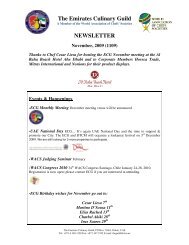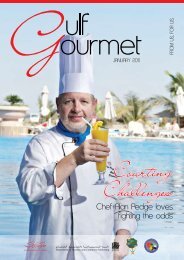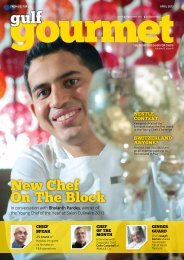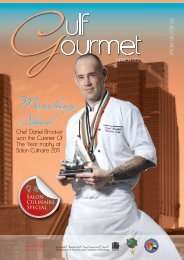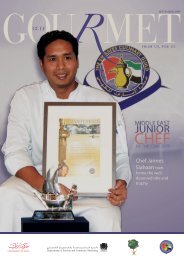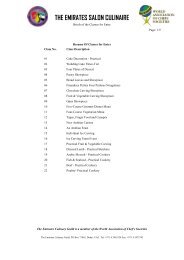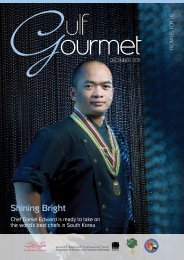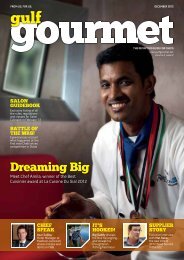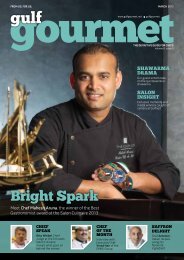Stability Personified - The Emirates Culinary Guild
Stability Personified - The Emirates Culinary Guild
Stability Personified - The Emirates Culinary Guild
Create successful ePaper yourself
Turn your PDF publications into a flip-book with our unique Google optimized e-Paper software.
suPPlier story<br />
28<br />
November 2012 Gulf Gourmet<br />
My home kitchen is equipped like a<br />
5-star hotel<br />
Aquin George meets Jagdish Menon, the man behind Mitras and its many food<br />
businesses in the UAE, to find out about him, his organisation, and its future plans<br />
Could you tell us about Mitras<br />
and your connection with it?<br />
Mitras is an international trading<br />
organisation dealing in commodities<br />
such as rice, sugar, coffee and tea<br />
with its core activities in East Africa.<br />
<strong>The</strong>y branched out to Dubai in 1992.<br />
I quit my job as Director of Catering<br />
at the Intercontinental to run its UAE<br />
operations. <strong>The</strong> business has been<br />
built ground up over here and I manage<br />
the entire spectrum of the food<br />
business at Mitras.<br />
What challenges did you face<br />
initially?<br />
To begin with, I did not come from<br />
a business background. All I knew<br />
was how to run restaurants and had<br />
a keen eye for quality food products.<br />
When we started out it was just me<br />
and a driver. <strong>The</strong> rest were all commodity<br />
traders managing the flow<br />
of dry goods between the East, West<br />
and Africa.<br />
Our first consignment was Uganda<br />
pineapples which were so sweet<br />
that it hardly had any shelf life. We<br />
had to drop it and think of a new<br />
strategy because our cargo aircraft<br />
would leave packed but return empty.<br />
We tried a lot of products including<br />
bananas and nothing worked. I<br />
flew to Africa and saw that we had a<br />
great fish factory and decided to fly<br />
in 1,000 kilos of Perch. I went to Chef<br />
Uwe to see if he would like to buy any<br />
of it and he showed keen interest. He<br />
purchased the entire 1,000 kilos from<br />
me and that was my first invoice.<br />
That gave us the confidence and<br />
courage to build the business. Today<br />
we do almost 1,000 tonnes of fish a<br />
month.<br />
What is Mitras’ strongest selling<br />
product today?<br />
Our biggest joint venture here is with<br />
Al Bawadi Group who handles Spinney’s.<br />
<strong>The</strong>re is a food processing business<br />
which focuses on fish. <strong>The</strong>re is a<br />
sea food division called Majenta. We<br />
do sanitised vegetables, fresh fruits<br />
and juices. We develop sauces and<br />
appetizer cuisines based solutions<br />
for restaurants and retail markets.<br />
We are also slowly branching out into<br />
meat products which along with fish<br />
will encompass our protein business.<br />
We have built a state-of-the-art<br />
200,000 sq ft in the Dubai fruit and<br />
vegetable market which opens this<br />
December. We have a centralised<br />
kitchen for our sauces and other solutions.<br />
Could you tell us about your<br />
growth with these businesses?<br />
Each business unit has its own team<br />
and our combined revenue would be<br />
in the range of AED 250 million. From<br />
a team of just nine staff we have<br />
grown to 600 employees in the UAE.<br />
<strong>The</strong>n we have distribution all over<br />
GCC and sub-distribution in certain<br />
parts. We are even integrating into<br />
November 2012 Gulf Gourmet<br />
India now. In the UAE, going forward<br />
we will have a state of the art facility<br />
in Dubai Investment Park for sea food<br />
processing and this should be ready<br />
by 2014.<br />
Within the hospitality sector,<br />
which is one product line you<br />
are trying to push in the coming<br />
years?<br />
We are looking at two things. First is<br />
sustainability. Second is bringing in<br />
fish that this region hasn’t been exposed<br />
to, especially from Alaska. We<br />
are also going more into tailor-made<br />
solutions. I believe that kitchens are<br />
getting smaller, chefs are becoming<br />
lesser and skills are getting tighter.<br />
This will make room for integrated<br />
industries that focus on tailor-made<br />
solutions as in the years to come the<br />
entire F&B industry will be in need<br />
of a lot of inventions including risk<br />
free development, portion control<br />
development, resource development,<br />
and so on.<br />
I don’t see why Black cod or a Chilian<br />
sea bass or king crab legs should<br />
only be found in a Jumeriah or in a<br />
Zuma. We want these to be in normal<br />
restaurants and make it affordable. It<br />
is this that we want to make happen<br />
since the masses eat here we are<br />
going to go more into cook programs,<br />
more into portion programs, with<br />
added focus on sustainability.<br />
How did you find food as a career?<br />
suPPlier cover story<br />
29



